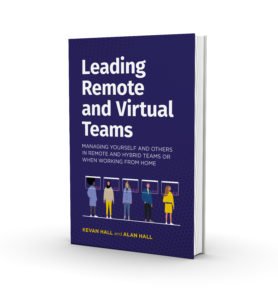How can we build trust in virtual and transient digital teams?
The glue that holds teams virtual teams together is trust. This fact is overwhelmingly backed up by the research: a recent meta-analysis of 112 academic studies covering over 7,700 teams found that people’s trust in their colleagues within a team was significantly correlated with team performance, over and above their trust in the team leader and past team performance.
Secondly, a review of 52 studies covering 12,615 individuals in 1,850 teams found that the relationship between team trust and team performance was stronger in virtual teams as compared to face-to-face teams.
Yet when we work with people remotely, or they’re from different cultures, different parts of the business or even different companies – we tend to treat them as resources – to be contacted only when we need something. When we’re co-located and from the same department, we treat them as people (and as a result tend to trust each other much more).
So how can we build trust in remote and virtual teams?
By creating and following what psychologists call ‘normative actions’ or standard ways of working. As well as getting the job done more effectively, we will swiftly build trust. Psychologists studied 68 temporary virtual teams that had no face-to-face interaction, and found that setting and monitoring standards to guide team performance (such as goals, schedules, technology-use norms), along with early beliefs that other team members were trustworthy, allowed teams to weather the inevitable set-backs and led to higher team performance.
Building virtual communities is also extremely important as it allows a sense of shared identity, social bonds and therefore trust to form.
Another solution is to make sure your work is freely available on online collaboration tools to those that want to search for it – rather than ‘pushing’ it unrequested onto others. John Stepper, a managing director at Deutsche Bank, created the bank’s Communities of Practice electronic discussion forums, in which 100,000 employees now converse with colleagues in similar roles around the world. Stepper calls this type of collaboration “working out loud.” Keeping this kind of ‘record in the cloud’ has also been found to reduce the imperative for lots of trust in virtual teams, as people can always check back on what was said or agreed upon.
This is particularly important for digital, fast-paced, transient teams where there is no time for ‘forming, norming, storming’. We need to focus on getting to ‘performing’ early on by assuming everyone’s trustworthy until proved otherwise – and getting stuck in to achieving early wins with each other. Chat about what we’ve done at the weekend and our family background can happen alongside hitting the first milestone – but there’s no time for long introductions and dedicated relationship building.
For more enduring and important tasks however, we still want to aim for deep trust, shared identity and a sense of community.
Find out more about our virtual teams training.
Read our book – Leading remote and virtual teams: Managing yourself and others in remote and hybrid teams or when working from home


Explore our training programs to see how we can help.
Agile & Digital Training Matrix Management Training People and purpose Training Virtual Teams TrainingEducate yourself further with a few more or our online insights:
30 years of experience learning with a range of world class clients
We work with a wide range of clients from global multinationals to recent start-ups. Our audiences span all levels, from CEOs to operational teams around the world. Our tools and programs have been developed for diverse and demanding audiences.

Tailored training or off the shelf modules for your people development needs
We are deep content experts in remote, virtual and hybrid working, matrix management and agile & digital leadership. We are highly flexible in how we deliver our content and ideas. We can tailor content closely to your specific needs or deliver off the shelf bite sized modules based on our existing IP and 30 years of training experience.
For more about how we deliver our keynotes, workshops, live web seminars and online learning.